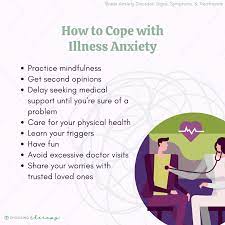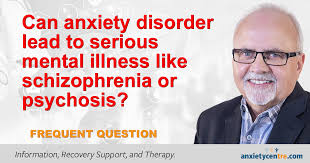Illness Anxiety Disorder: Understanding and Overcoming Health Anxiety
Health is a precious asset that we all value. However, for some individuals, the fear of having a serious illness can become overwhelming and consume their thoughts, leading to a condition known as Illness Anxiety Disorder (IAD), previously referred to as hypochondriasis.
What is Illness Anxiety Disorder?
Illness Anxiety Disorder is characterized by excessive worry and preoccupation with having a serious medical condition, despite little or no medical evidence to support the belief. People with IAD often misinterpret normal bodily sensations as signs of a severe illness, causing distress and interfering with their daily lives.
Symptoms of Illness Anxiety Disorder
Individuals with IAD may exhibit various symptoms, including:
Persistent fear of having a serious illness.
Constant checking of the body for signs or symptoms.
Frequent seeking of reassurance from healthcare professionals.
Excessive internet searches about illnesses and symptoms.
Avoidance of situations that may trigger anxiety about health.
High levels of anxiety and distress related to health concerns.
Causes and Risk Factors
The exact cause of Illness Anxiety Disorder is not fully understood. However, several factors may contribute to its development:
Biological factors: Genetic predisposition or imbalances in brain chemicals may play a role in IAD.
Psychological factors: Past experiences with illness or trauma can heighten health-related fears.
Personality traits: People who are generally anxious or have high levels of neuroticism may be more prone to developing IAD.
Environmental factors: Exposure to significant stressors or having family members with health anxiety can increase the risk.
Overcoming Illness Anxiety Disorder
Fortunately, there are effective strategies for managing and overcoming Illness Anxiety Disorder:
Psychotherapy: Cognitive Behavioral Therapy (CBT) has shown promising results in treating IAD by helping individuals challenge and change their anxious thoughts and behaviors.
Education: Learning about the nature of IAD can help individuals understand that their fears are disproportionate to actual health risks.
Relaxation techniques: Practicing relaxation exercises, such as deep breathing or meditation, can help reduce anxiety levels.
Limiting reassurance-seeking behaviors: Gradually reducing the need for constant reassurance from healthcare professionals can help break the cycle of anxiety.
Support network: Engaging with supportive family and friends who understand and validate your concerns can provide emotional comfort.
Seeking Professional Help
If you or someone you know is struggling with Illness Anxiety Disorder, it is crucial to seek professional help. A mental health professional, such as a psychologist or psychiatrist, can provide an accurate diagnosis and develop an individualized treatment plan.
Remember, overcoming Illness Anxiety Disorder takes time and effort. With the right support and treatment, it is possible to regain control over your thoughts and live a fulfilling life free from excessive health worries.
Disclaimer: This article is for informational purposes only and should not replace professional medical advice. If you have concerns about your health, consult a qualified healthcare professional.
5 Tips for Managing Illness Anxiety Disorder
- Talk to a mental health professional about your symptoms and concerns.
- Learn more about IAD and how it can be managed.
- Develop healthy coping strategies such as mindfulness, relaxation, and deep breathing exercises.
- Practice self-care activities such as getting enough sleep, eating nutritious foods, exercising regularly, and spending time with supportive people in your life.
- Challenge negative thoughts related to illness by writing down evidence that contradicts them or replacing them with more realistic thoughts or statements of self-compassion.
Talk to a mental health professional about your symptoms and concerns.
Seeking Guidance: Talking to a Mental Health Professional about Illness Anxiety Disorder
When it comes to managing Illness Anxiety Disorder (IAD), one of the most important steps you can take is reaching out to a mental health professional. They are trained to understand and address the complexities of this condition, providing you with the support and guidance needed to navigate your symptoms and concerns.
Opening up about your symptoms and worries to a mental health professional can be a transformative experience. Here’s why:
- Accurate Diagnosis: Mental health professionals have the knowledge and expertise to accurately diagnose IAD. By discussing your symptoms, fears, and experiences, they can assess whether you meet the criteria for this disorder or if there may be other underlying factors contributing to your distress.
- Understanding Your Concerns: Sharing your concerns with a mental health professional allows them to gain insight into the specific fears and anxieties you may be experiencing. They can help you explore the root causes of these concerns, identify triggers, and develop coping strategies tailored to your unique situation.
- Validation and Support: It’s common for individuals with IAD to feel misunderstood or invalidated by others who may not grasp the extent of their anxiety. Mental health professionals provide a safe space where you can openly discuss your worries without judgment. They offer validation for your experiences and provide ongoing support throughout your journey towards healing.
- Evidence-Based Treatment: Mental health professionals are equipped with evidence-based treatment approaches that have proven effective in managing IAD. They can introduce therapeutic techniques such as Cognitive Behavioral Therapy (CBT) or Exposure Response Prevention (ERP) that target distorted thoughts, reduce anxiety, and help reframe beliefs around illness.
- Collaborative Care: Working alongside a mental health professional fosters collaborative care between you and an expert who understands IAD intimately. Together, you can establish treatment goals, create personalized strategies for managing anxiety, develop healthy coping mechanisms, and track progress over time.
Remember, seeking help is a sign of strength, and you don’t have to face IAD alone. By talking to a mental health professional, you are taking an important step towards understanding your condition and gaining the tools necessary to reclaim control over your thoughts and fears. Reach out today and embark on a path towards healing and well-being.
Learn more about IAD and how it can be managed.
If you or someone you know is struggling with Illness Anxiety Disorder (IAD), it’s essential to educate yourself about this condition and its management. By understanding IAD better, you can gain insight into the underlying causes, symptoms, and effective strategies for coping.
IAD, also known as health anxiety or hypochondriasis, is characterized by excessive worry and fear of having a severe medical condition. Individuals with IAD often misinterpret normal bodily sensations as signs of illness, leading to heightened anxiety and distress.
To manage IAD effectively, consider the following steps:
- Educate Yourself: Take the time to learn more about IAD from reputable sources such as medical websites, books, or articles written by professionals in the field. Understanding the nature of the disorder can help demystify your fears and provide a solid foundation for managing your symptoms.
- Seek Professional Help: It’s crucial to consult with a mental health professional who specializes in anxiety disorders. They can provide an accurate diagnosis, develop a personalized treatment plan, and offer guidance throughout your journey towards recovery.
- Cognitive Behavioral Therapy (CBT): CBT is a widely recognized therapeutic approach that has shown great success in treating IAD. It focuses on identifying and challenging negative thought patterns associated with health anxiety. Through CBT techniques, individuals can learn to reframe their thoughts and develop healthier coping mechanisms.
- Practice Self-Care: Engaging in self-care activities can help reduce stress levels associated with IAD. Regular exercise, adequate sleep, healthy eating habits, relaxation techniques (such as deep breathing or meditation), and maintaining social connections are all vital components of self-care that contribute to overall well-being.
- Support Network: Building a support network of understanding friends or family members who validate your concerns can be immensely helpful when managing IAD. Sharing your experiences with others who have similar struggles can provide a sense of belonging and reduce feelings of isolation.
Remember, managing IAD is a journey that requires patience and perseverance. By arming yourself with knowledge, seeking professional help, and implementing self-care strategies, you can take steps towards managing your health anxiety and regaining control over your life.
Disclaimer: This article is for informational purposes only and should not replace professional medical advice. If you have concerns about your health or mental well-being, consult a qualified healthcare professional.
Develop healthy coping strategies such as mindfulness, relaxation, and deep breathing exercises.
Developing Healthy Coping Strategies for Illness Anxiety Disorder
Living with Illness Anxiety Disorder (IAD) can be challenging, but there are effective coping strategies that can help manage the distress and anxiety associated with this condition. One valuable tip is to develop healthy coping strategies such as mindfulness, relaxation techniques, and deep breathing exercises.
Mindfulness is the practice of being fully present in the moment, without judgment or attachment to thoughts or worries. By cultivating mindfulness, individuals with IAD can learn to observe their anxious thoughts and physical sensations without getting caught up in them. This can help create a sense of detachment from health-related worries and reduce the impact they have on daily life.
Relaxation techniques, such as progressive muscle relaxation or guided imagery, can also be beneficial for individuals with IAD. These practices promote physical and mental relaxation by systematically tensing and then releasing different muscle groups or by visualizing calming scenes. Engaging in regular relaxation exercises can help reduce overall anxiety levels and provide a sense of calmness and control.
Deep breathing exercises are another effective tool for managing anxiety associated with IAD. When we feel anxious, our breathing tends to become shallow and rapid, which further contributes to feelings of distress. By practicing deep breathing exercises, individuals can activate their body’s natural relaxation response, slowing down their heart rate and promoting a sense of calm. Taking slow, deep breaths in through the nose and out through the mouth can help regulate breathing patterns and alleviate anxiety symptoms.
Incorporating these coping strategies into daily life may require practice and consistency. It can be helpful to set aside dedicated time each day for mindfulness or relaxation exercises. Additionally, integrating these techniques into moments of heightened anxiety or worry about health can provide immediate relief.
Remember that everyone’s journey with IAD is unique, so it’s essential to find coping strategies that work best for you personally. Consulting with a mental health professional experienced in treating anxiety disorders can provide guidance and support in developing an individualized coping plan.
By incorporating mindfulness, relaxation techniques, and deep breathing exercises into your daily routine, you can develop healthy coping strategies that empower you to manage the symptoms of Illness Anxiety Disorder and enhance your overall well-being.
Practice self-care activities such as getting enough sleep, eating nutritious foods, exercising regularly, and spending time with supportive people in your life.
The Power of Self-Care in Managing Illness Anxiety Disorder
When it comes to managing Illness Anxiety Disorder (IAD), self-care plays a crucial role in promoting overall well-being and reducing anxiety. Taking care of yourself physically, mentally, and emotionally can have a profound impact on your ability to cope with health-related worries. Here are some self-care activities that can help individuals with IAD:
- Getting Enough Sleep: Sleep is essential for our physical and mental health. Adequate sleep allows our bodies to rest, repair, and recharge. Establishing a consistent sleep routine and creating a relaxing bedtime environment can promote better sleep quality, reducing anxiety levels.
- Eating Nutritious Foods: A balanced diet rich in nutrients is vital for maintaining optimal health. Consuming a variety of fruits, vegetables, whole grains, lean proteins, and healthy fats nourishes the body and supports overall well-being. Avoiding excessive caffeine or sugary foods can also help stabilize energy levels and reduce anxiety symptoms.
- Exercising Regularly: Engaging in regular physical activity not only benefits our physical health but also has positive effects on our mental well-being. Exercise releases endorphins, which are natural mood boosters that can help alleviate anxiety symptoms. Finding an exercise routine that you enjoy – whether it’s walking, yoga, or dancing – can make it easier to incorporate into your daily life.
- Spending Time with Supportive People: Surrounding yourself with supportive individuals who understand your struggles can provide comfort and reassurance during difficult times. Whether it’s family members, friends, or support groups, having a strong support network can help you feel understood and less alone in your journey.
- Engaging in Relaxation Techniques: Incorporating relaxation techniques into your daily routine can be beneficial for managing anxiety associated with IAD. Techniques such as deep breathing exercises, meditation, mindfulness practices, or engaging in hobbies that bring you joy and relaxation can help calm the mind and reduce stress levels.
Remember, self-care is not a one-size-fits-all approach. It’s essential to find activities that resonate with you and bring you a sense of peace and well-being. Experiment with different self-care practices and listen to your body’s needs. By prioritizing self-care, you can empower yourself to better manage IAD and improve your overall quality of life.
Disclaimer: This article is for informational purposes only and should not replace professional medical advice. If you have concerns about your health or mental well-being, consult a qualified healthcare professional.
Challenge negative thoughts related to illness by writing down evidence that contradicts them or replacing them with more realistic thoughts or statements of self-compassion.
Overcoming Illness Anxiety Disorder: Challenging Negative Thoughts and Cultivating Self-Compassion
When it comes to illness anxiety disorder (IAD), negative thoughts and irrational beliefs can fuel anxiety and distress. However, by challenging these thoughts and replacing them with more realistic perspectives or statements of self-compassion, individuals can take significant steps towards managing their condition and regaining control over their lives.
Negative thoughts related to illness often involve catastrophic thinking, assuming the worst-case scenarios about one’s health. To counteract these thoughts, a helpful technique is to write down evidence that contradicts them. For example, if you’re worried that a headache is a sign of a brain tumor, list other possible explanations such as stress or lack of sleep. By objectively examining alternative possibilities, you can challenge the validity of your fearful beliefs.
Furthermore, replacing negative thoughts with more realistic ones can help reframe your perspective. Instead of catastrophizing symptoms, consider more balanced interpretations. For instance, instead of thinking “I must have a life-threatening disease,” reframe it as “It’s more likely that this symptom is temporary or harmless.” By shifting your mindset towards more rational and realistic thoughts, you can alleviate unnecessary anxiety.
In addition to challenging negative thoughts, practicing self-compassion is crucial in managing illness anxiety disorder. Often individuals with IAD blame themselves for their excessive worries or feel guilty for seeking reassurance repeatedly. Engaging in self-compassionate statements like “It’s understandable to have concerns about my health” or “I deserve kindness and understanding during difficult moments” can help cultivate a more gentle and forgiving attitude towards oneself.
Remember that overcoming illness anxiety disorder takes time and effort. It’s essential to be patient with yourself throughout the process and seek support from mental health professionals who specialize in anxiety disorders if needed.
By challenging negative thoughts related to illness and embracing self-compassion, individuals with IAD can gradually reduce anxiety, regain confidence, and live more fulfilling lives. Remember, you have the power to reshape your thoughts and take control of your well-being.



